M1 Wonders of the world Unit 3 Language in use-初中英语外研版九年级上册课件(30张PPT)
文档属性
| 名称 | M1 Wonders of the world Unit 3 Language in use-初中英语外研版九年级上册课件(30张PPT) |
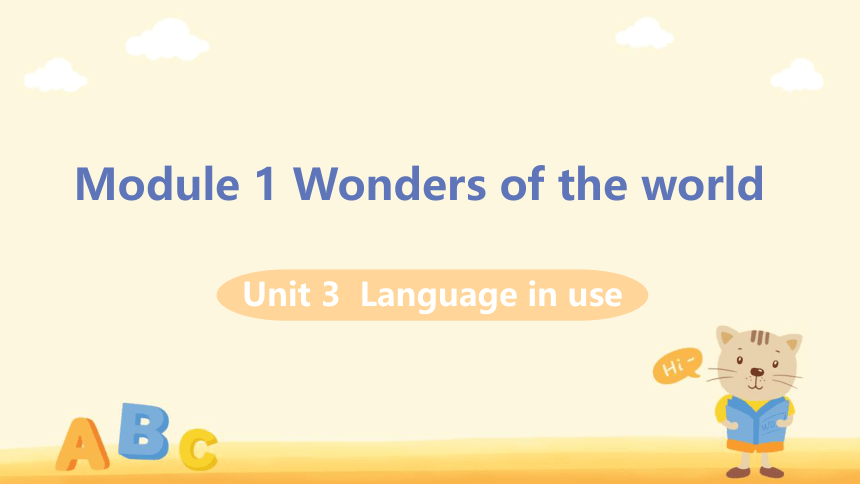
|
|
| 格式 | pptx | ||
| 文件大小 | 4.8MB | ||
| 资源类型 | 教案 | ||
| 版本资源 | 外研版 | ||
| 科目 | 英语 | ||
| 更新时间 | 2023-08-16 22:19:26 | ||
图片预览

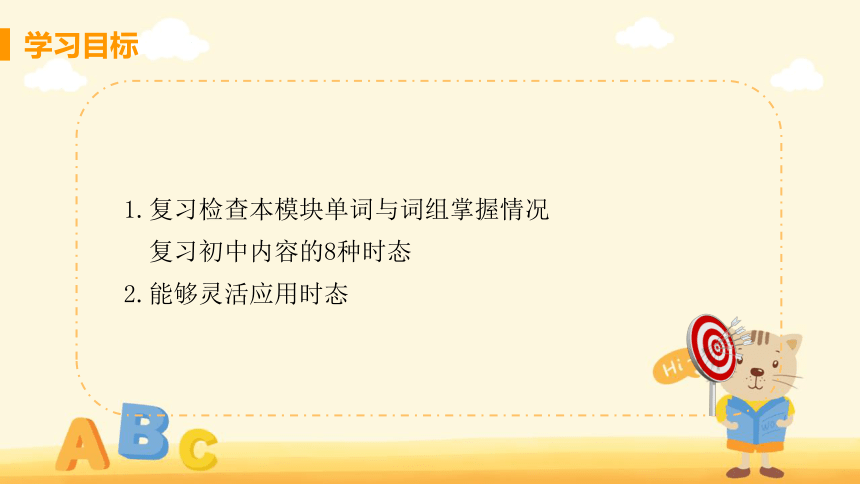
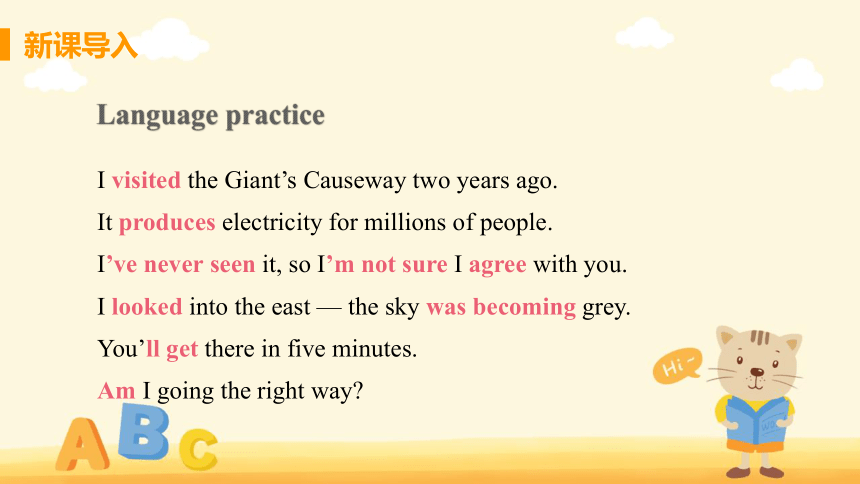
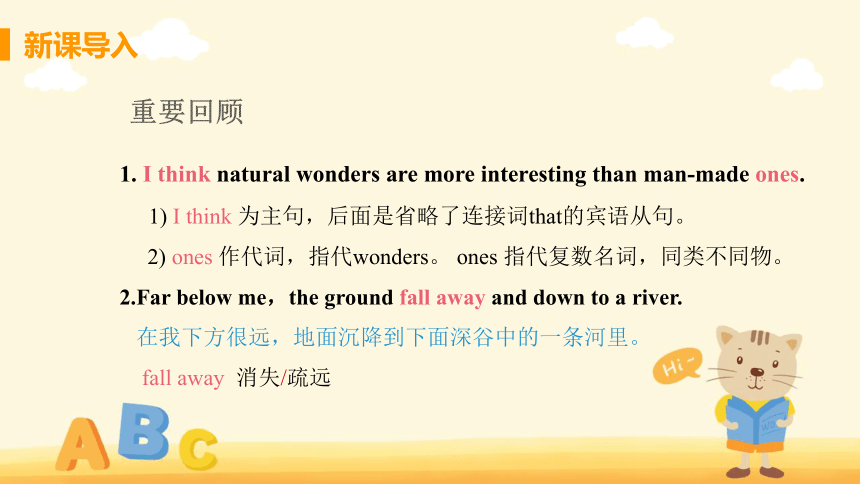
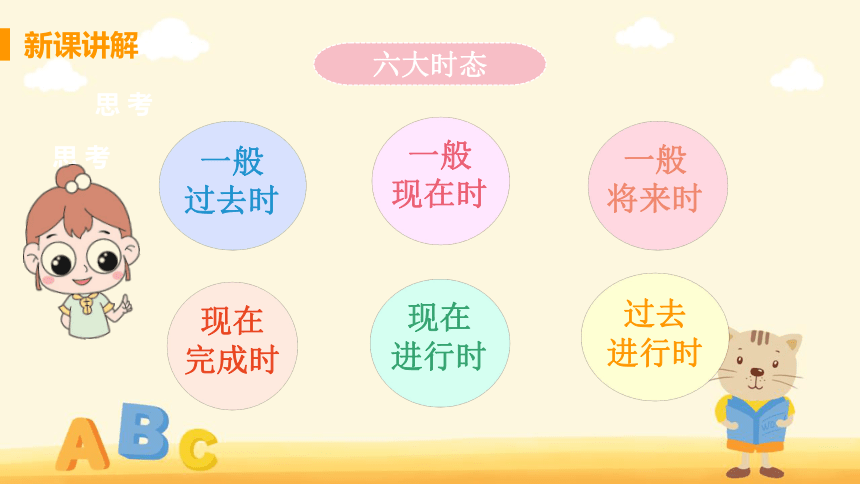
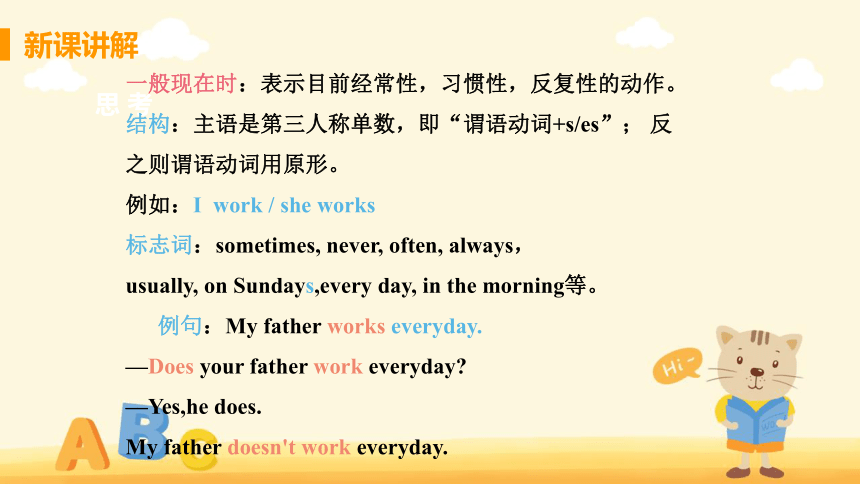
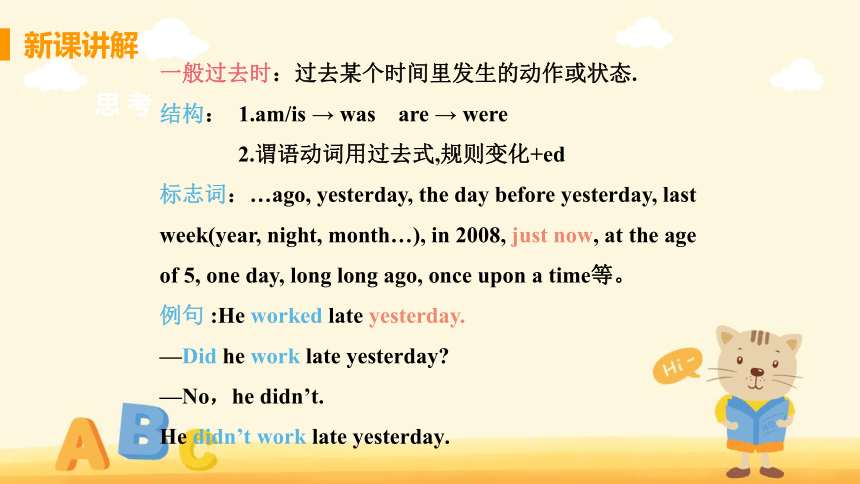
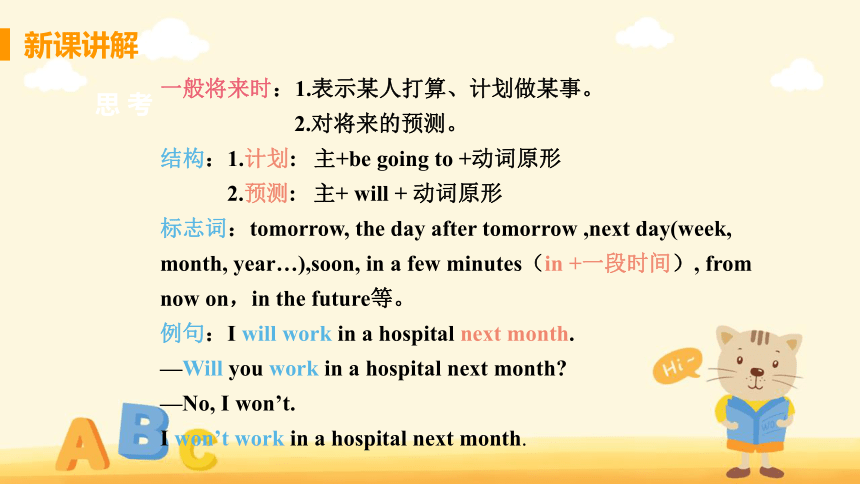

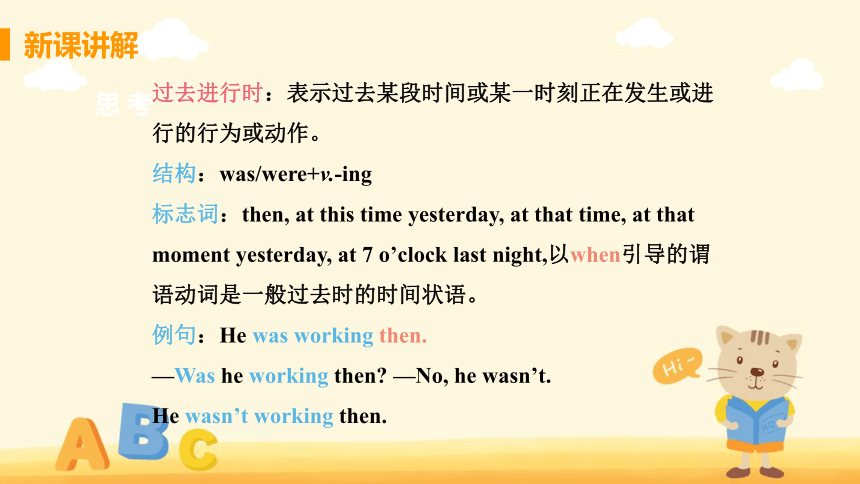
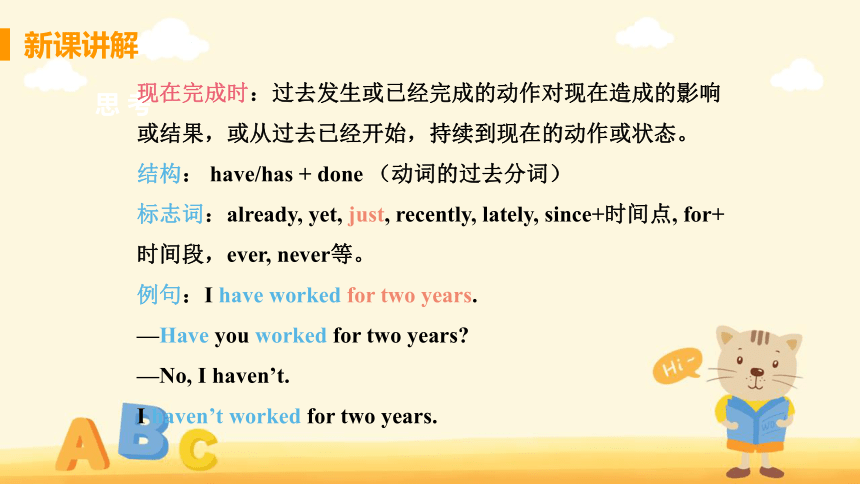
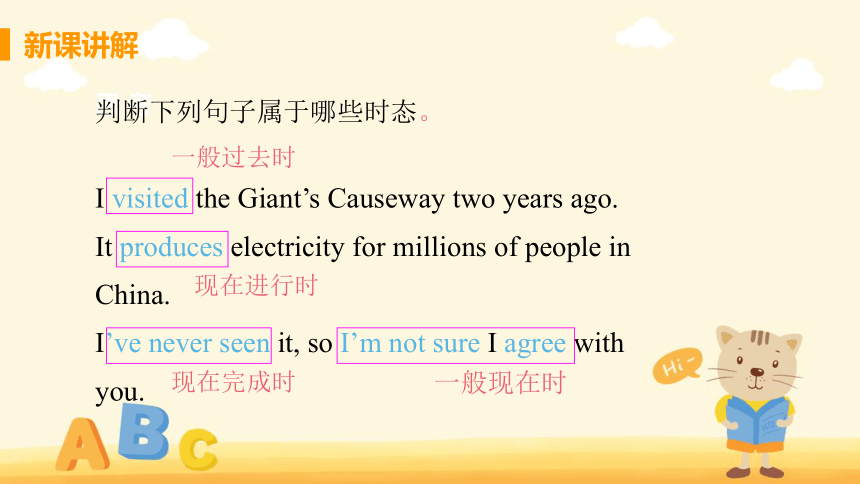
文档简介
(共30张PPT)
Module 1 Wonders of the world
Unit 3 Language in use
学习目标
1.复习检查本模块单词与词组掌握情况
复习初中内容的8种时态
2.能够灵活应用时态
新课导入
Language practice
I visited the Giant’s Causeway two years ago.
It produces electricity for millions of people.
I’ve never seen it, so I’m not sure I agree with you.
I looked into the east — the sky was becoming grey.
You’ll get there in five minutes.
Am I going the right way
新课导入
重要回顾
1. I think natural wonders are more interesting than man-made ones.
1) I think 为主句,后面是省略了连接词that的宾语从句。
2) ones 作代词,指代wonders。 ones 指代复数名词,同类不同物。
2.Far below me,the ground fall away and down to a river.
在我下方很远,地面沉降到下面深谷中的一条河里。
fall away 消失/疏远
思 考
新课讲解
思 考
六大时态
一般
过去时
一般
现在时
一般
将来时
现在
完成时
现在
进行时
过去
进行时
思 考
新课讲解
一般现在时:表示目前经常性,习惯性,反复性的动作。
结构:主语是第三人称单数,即“谓语动词+s/es”; 反
之则谓语动词用原形。
例如:I work / she works
标志词:sometimes, never, often, always,
usually, on Sundays,every day, in the morning等。
例句:My father works everyday.
—Does your father work everyday
—Yes,he does.
My father doesn't work everyday.
思 考
新课讲解
一般过去时:过去某个时间里发生的动作或状态.
结构: 1.am/is → was are → were
2.谓语动词用过去式,规则变化+ed
标志词:…ago, yesterday, the day before yesterday, last week(year, night, month…), in 2008, just now, at the age of 5, one day, long long ago, once upon a time等。
例句 :He worked late yesterday.
—Did he work late yesterday
—No,he didn’t.
He didn’t work late yesterday.
思 考
新课讲解
一般将来时:1.表示某人打算、计划做某事。
2.对将来的预测。
结构:1.计划: 主+be going to +动词原形
2.预测: 主+ will + 动词原形
标志词:tomorrow, the day after tomorrow ,next day(week, month, year…),soon, in a few minutes(in +一段时间), from now on,in the future等。
例句:I will work in a hospital next month.
—Will you work in a hospital next month
—No, I won’t.
I won’t work in a hospital next month.
思 考
新课讲解
现在进行时:表示正在发生或一段时间内正在发生的动作。
结构:主+be(am, is, are)+ v.-ing
标志词:now, at this time, these days, look, listen,at the moment, It’s seven o’clock 等。
例句:They are working now.
—Are they working now
—No, they aren’t. =They aren’t working now.
思 考
新课讲解
过去进行时:表示过去某段时间或某一时刻正在发生或进行的行为或动作。
结构:was/were+v.-ing
标志词:then, at this time yesterday, at that time, at that moment yesterday, at 7 o’clock last night,以when引导的谓语动词是一般过去时的时间状语。
例句:He was working then.
—Was he working then —No, he wasn’t.
He wasn’t working then.
思 考
新课讲解
现在完成时:过去发生或已经完成的动作对现在造成的影响或结果,或从过去已经开始,持续到现在的动作或状态。
结构: have/has + done (动词的过去分词)
标志词:already, yet, just, recently, lately, since+时间点, for+时间段,ever, never等。
例句:I have worked for two years.
—Have you worked for two years
—No, I haven’t.
I haven’t worked for two years.
思 考
新课讲解
判断下列句子属于哪些时态。
I visited the Giant’s Causeway two years ago.
It produces electricity for millions of people in China.
I’ve never seen it, so I’m not sure I agree with you.
一般过去时
现在进行时
现在完成时
一般现在时
思 考
新课讲解
一般过去时
I looked to the east - the sky was becoming grey.
You’ll get there in five minutes.
Am I going the right way
过去进行时
一般将来时
现在进行时
思 考
新课讲解
1
Explain the difference in meaning between Sentences a) and b).
1. a) I often play basketball.
b) I’m playing basketball now.
Playing basketball is what I do regularly.
Playing basketball is what I am doing now.
一般现在时
现在进行时
思 考
新课讲解
2. a) She has gone to the Great Wall.
3. a) They had an English class yesterday.
She is still at the Great Wall.
She has come back from the Great Wall.
b) She has been to the Great Wall .
b) They were having an English class at nine o’clock yesterday morning.
现在完成时
现在完成时
They did it in the past.
They were doing something at a specific time.
一般过去时
过去进行时
思 考
新课讲解
5. a) We are drawing a picture of Victoria Falls now.
They’re drawing the picture now.
b) We will draw a picture of Victoria Falls.
They will draw it in the future.
现在进行时
一般将来时
4. a) He is doing an interview.
He is doing the interview now.
b) He has done an interview.
He has already finished the interview.
现在进行时
现在完成时
思 考
新课讲解
2
Complete the sentences with the correct form of the words in the box.
appear finish give rain talk visit walk
1.Listen! It _________ outside.
2.The great musician ___________ a concert in Guangzhou next month.
3.Last summer, my parents _________ the Terracotta Army in Xi’an.
4.He ______ already _______ a new book about travel.
5.Thousands of people ________ along the Great Wall every year.
6.A few minutes later, a stranger __________ at the end of the street.
7.The students ____________ about the journey to the Grand Canyon
when the teacher came in.
is raining
will give
visited
has finished
walk
appeared
were talking
思 考
新课讲解
3
Complete the passage with the correct form of the words in the brackets.
The sun was going down when we (1)______ (arrive) at the ground floor of the building. I (2)______(be) afraid of going to the top of the tall building so I was a little nervous as we (3)___________(wait) for the lift.
The lift (4)________ (climb) faster and faster until we(5)_______ (reach) the 88th floor. It (6)______ (be)high up there, but I was not afraid when I (7) __________(stand) at the top.
arrived
was
were waiting
climbed
reached
was standing
was
思 考
新课讲解
The Jin Mao Tower in Shanghai, one of the tallest buildings in the world, (8)_____(be) 420.5 metres high. It was built in 1999, and it (9)_______(have)a fantastic view of Pudong District and the centre of Shanghai. I really like the tower and I’m sure I (10)_________ (visit) it again.
is
has
will visit
思 考
新课讲解
Now complete the table.
Wonders of the world When did you visit it When will you visit it
The Great Wall
新课讲解
5
Complete the sentences with the correct form of the words in the box. There is one extra word.
ancient high long natural opinion wonder
1.The Chang jiang River is about 6,300 kilometres ______.
2.The Terracotta Army is a famous ________ wonder in China.
3.For my homework I have to write an article about the _________wonders of the world.
4.Mount Qomolangma is the __________ mountain in the world.
5.In my _________, the Great Wall is the greatest man-made wonder in the world.
long
ancient
natural
highest
opinion
新课讲解
6
Complete the passage with the expressions in the box.
agree with at the bottom of go through
looking forward to millions of more than
I’m really (1) ________________ my visit to the Louvre Museum in Paris. It’s the most visited museum in the world — every year, (2) _________ people visit it. The Louvre is in an old building, but to get inside you must (3) ________ a giant glass pyramid that is (4) __________ 20 metres tall. The entrance to the museum is (5) _____________ the pyramid. Some people do not like the glass pyramid. They say it looks too new and does not suit the older building. I do not (6) _________ them. I think it looks great!
looking forward to
millions of
go through
more than
at the bottom of
agree with
新课讲解
7
Listen and number the pictures.
a
b
c
新课讲解
8
Listen again and complete the table.
Mount Qomolangma The Empire State Building The Great Pyramid at Giza
Location Between China and Nepal ___________ ________ In Egypt
Height __________metres ______metres About _______metres now
Interesting facts First people to climb to the top: Sir Edmund Hillary and Tenzing Norgay _________ __floors About ________years old
In New York,
the US
8, 844.43
381
137
102
4,500
新课讲解
Work in pairs
9
Think about three other wonders of the world and ask and answer questions about them.
A: Where is …
B: It’s…
A: How high is it
B: It’s …metres high.
当堂小练
I. 用所给动词的适当形式填空。
1. How often _______your mother _____(go) shopping
2. Peter _______(go) to watch the basketball match if
he is free tomorrow.
3. Linda_______________(visit) the Science Museum next Sunday.
4. Mr Huang_______(teach) us English two years ago.
5. Mr Green _________(live) in Beijing since he came to China.
does
go
will go
is going to visit
taught
has lived
当堂小练
6. The Kings ______________(watch) TV at this time last night.
7. Tony will come to my birthday party if it ___________ (not rain) tomorrow.
8. My cousin is a student and he ________(study) at a middle school nearby.
9. My father________(be) to Beijing three times this year.
10. Listen! Who _________(play) the piano in the next room
were watching
doesn't rain
studies
has been
is playing
当堂小练
Ⅱ. 根据汉语提示完成下面的句子。
1. Amy____________(害怕) heights, so she was very nervous when she came to the top of the building.
2. I _____________________(盼望) visiting the Great Wall these days.
3. The manager__________________ (在开会) and can’t answer your call now.
was afraid of
am looking forward to
is having a meeting
当堂小练
4. When the sun___________(落山), it will get dark.
5. When spring comes, you can see__________(各种各样) flowers in that park.
6. Tomorrow Mr Brown will be busy and won’t
__________(能) come.
goes down
all kinds of
be able to
归 纳
课堂小结
Language points
will/ shall/ be going to + 动词原形
be+动词的现在分词(v.-ing)
have/ has+动词的过去分词(v.-ed)
was/ were+动词的现在分词(v.-ing)
Key words
appear finish give rain talk visit walk
Module 1 Wonders of the world
Unit 3 Language in use
学习目标
1.复习检查本模块单词与词组掌握情况
复习初中内容的8种时态
2.能够灵活应用时态
新课导入
Language practice
I visited the Giant’s Causeway two years ago.
It produces electricity for millions of people.
I’ve never seen it, so I’m not sure I agree with you.
I looked into the east — the sky was becoming grey.
You’ll get there in five minutes.
Am I going the right way
新课导入
重要回顾
1. I think natural wonders are more interesting than man-made ones.
1) I think 为主句,后面是省略了连接词that的宾语从句。
2) ones 作代词,指代wonders。 ones 指代复数名词,同类不同物。
2.Far below me,the ground fall away and down to a river.
在我下方很远,地面沉降到下面深谷中的一条河里。
fall away 消失/疏远
思 考
新课讲解
思 考
六大时态
一般
过去时
一般
现在时
一般
将来时
现在
完成时
现在
进行时
过去
进行时
思 考
新课讲解
一般现在时:表示目前经常性,习惯性,反复性的动作。
结构:主语是第三人称单数,即“谓语动词+s/es”; 反
之则谓语动词用原形。
例如:I work / she works
标志词:sometimes, never, often, always,
usually, on Sundays,every day, in the morning等。
例句:My father works everyday.
—Does your father work everyday
—Yes,he does.
My father doesn't work everyday.
思 考
新课讲解
一般过去时:过去某个时间里发生的动作或状态.
结构: 1.am/is → was are → were
2.谓语动词用过去式,规则变化+ed
标志词:…ago, yesterday, the day before yesterday, last week(year, night, month…), in 2008, just now, at the age of 5, one day, long long ago, once upon a time等。
例句 :He worked late yesterday.
—Did he work late yesterday
—No,he didn’t.
He didn’t work late yesterday.
思 考
新课讲解
一般将来时:1.表示某人打算、计划做某事。
2.对将来的预测。
结构:1.计划: 主+be going to +动词原形
2.预测: 主+ will + 动词原形
标志词:tomorrow, the day after tomorrow ,next day(week, month, year…),soon, in a few minutes(in +一段时间), from now on,in the future等。
例句:I will work in a hospital next month.
—Will you work in a hospital next month
—No, I won’t.
I won’t work in a hospital next month.
思 考
新课讲解
现在进行时:表示正在发生或一段时间内正在发生的动作。
结构:主+be(am, is, are)+ v.-ing
标志词:now, at this time, these days, look, listen,at the moment, It’s seven o’clock 等。
例句:They are working now.
—Are they working now
—No, they aren’t. =They aren’t working now.
思 考
新课讲解
过去进行时:表示过去某段时间或某一时刻正在发生或进行的行为或动作。
结构:was/were+v.-ing
标志词:then, at this time yesterday, at that time, at that moment yesterday, at 7 o’clock last night,以when引导的谓语动词是一般过去时的时间状语。
例句:He was working then.
—Was he working then —No, he wasn’t.
He wasn’t working then.
思 考
新课讲解
现在完成时:过去发生或已经完成的动作对现在造成的影响或结果,或从过去已经开始,持续到现在的动作或状态。
结构: have/has + done (动词的过去分词)
标志词:already, yet, just, recently, lately, since+时间点, for+时间段,ever, never等。
例句:I have worked for two years.
—Have you worked for two years
—No, I haven’t.
I haven’t worked for two years.
思 考
新课讲解
判断下列句子属于哪些时态。
I visited the Giant’s Causeway two years ago.
It produces electricity for millions of people in China.
I’ve never seen it, so I’m not sure I agree with you.
一般过去时
现在进行时
现在完成时
一般现在时
思 考
新课讲解
一般过去时
I looked to the east - the sky was becoming grey.
You’ll get there in five minutes.
Am I going the right way
过去进行时
一般将来时
现在进行时
思 考
新课讲解
1
Explain the difference in meaning between Sentences a) and b).
1. a) I often play basketball.
b) I’m playing basketball now.
Playing basketball is what I do regularly.
Playing basketball is what I am doing now.
一般现在时
现在进行时
思 考
新课讲解
2. a) She has gone to the Great Wall.
3. a) They had an English class yesterday.
She is still at the Great Wall.
She has come back from the Great Wall.
b) She has been to the Great Wall .
b) They were having an English class at nine o’clock yesterday morning.
现在完成时
现在完成时
They did it in the past.
They were doing something at a specific time.
一般过去时
过去进行时
思 考
新课讲解
5. a) We are drawing a picture of Victoria Falls now.
They’re drawing the picture now.
b) We will draw a picture of Victoria Falls.
They will draw it in the future.
现在进行时
一般将来时
4. a) He is doing an interview.
He is doing the interview now.
b) He has done an interview.
He has already finished the interview.
现在进行时
现在完成时
思 考
新课讲解
2
Complete the sentences with the correct form of the words in the box.
appear finish give rain talk visit walk
1.Listen! It _________ outside.
2.The great musician ___________ a concert in Guangzhou next month.
3.Last summer, my parents _________ the Terracotta Army in Xi’an.
4.He ______ already _______ a new book about travel.
5.Thousands of people ________ along the Great Wall every year.
6.A few minutes later, a stranger __________ at the end of the street.
7.The students ____________ about the journey to the Grand Canyon
when the teacher came in.
is raining
will give
visited
has finished
walk
appeared
were talking
思 考
新课讲解
3
Complete the passage with the correct form of the words in the brackets.
The sun was going down when we (1)______ (arrive) at the ground floor of the building. I (2)______(be) afraid of going to the top of the tall building so I was a little nervous as we (3)___________(wait) for the lift.
The lift (4)________ (climb) faster and faster until we(5)_______ (reach) the 88th floor. It (6)______ (be)high up there, but I was not afraid when I (7) __________(stand) at the top.
arrived
was
were waiting
climbed
reached
was standing
was
思 考
新课讲解
The Jin Mao Tower in Shanghai, one of the tallest buildings in the world, (8)_____(be) 420.5 metres high. It was built in 1999, and it (9)_______(have)a fantastic view of Pudong District and the centre of Shanghai. I really like the tower and I’m sure I (10)_________ (visit) it again.
is
has
will visit
思 考
新课讲解
Now complete the table.
Wonders of the world When did you visit it When will you visit it
The Great Wall
新课讲解
5
Complete the sentences with the correct form of the words in the box. There is one extra word.
ancient high long natural opinion wonder
1.The Chang jiang River is about 6,300 kilometres ______.
2.The Terracotta Army is a famous ________ wonder in China.
3.For my homework I have to write an article about the _________wonders of the world.
4.Mount Qomolangma is the __________ mountain in the world.
5.In my _________, the Great Wall is the greatest man-made wonder in the world.
long
ancient
natural
highest
opinion
新课讲解
6
Complete the passage with the expressions in the box.
agree with at the bottom of go through
looking forward to millions of more than
I’m really (1) ________________ my visit to the Louvre Museum in Paris. It’s the most visited museum in the world — every year, (2) _________ people visit it. The Louvre is in an old building, but to get inside you must (3) ________ a giant glass pyramid that is (4) __________ 20 metres tall. The entrance to the museum is (5) _____________ the pyramid. Some people do not like the glass pyramid. They say it looks too new and does not suit the older building. I do not (6) _________ them. I think it looks great!
looking forward to
millions of
go through
more than
at the bottom of
agree with
新课讲解
7
Listen and number the pictures.
a
b
c
新课讲解
8
Listen again and complete the table.
Mount Qomolangma The Empire State Building The Great Pyramid at Giza
Location Between China and Nepal ___________ ________ In Egypt
Height __________metres ______metres About _______metres now
Interesting facts First people to climb to the top: Sir Edmund Hillary and Tenzing Norgay _________ __floors About ________years old
In New York,
the US
8, 844.43
381
137
102
4,500
新课讲解
Work in pairs
9
Think about three other wonders of the world and ask and answer questions about them.
A: Where is …
B: It’s…
A: How high is it
B: It’s …metres high.
当堂小练
I. 用所给动词的适当形式填空。
1. How often _______your mother _____(go) shopping
2. Peter _______(go) to watch the basketball match if
he is free tomorrow.
3. Linda_______________(visit) the Science Museum next Sunday.
4. Mr Huang_______(teach) us English two years ago.
5. Mr Green _________(live) in Beijing since he came to China.
does
go
will go
is going to visit
taught
has lived
当堂小练
6. The Kings ______________(watch) TV at this time last night.
7. Tony will come to my birthday party if it ___________ (not rain) tomorrow.
8. My cousin is a student and he ________(study) at a middle school nearby.
9. My father________(be) to Beijing three times this year.
10. Listen! Who _________(play) the piano in the next room
were watching
doesn't rain
studies
has been
is playing
当堂小练
Ⅱ. 根据汉语提示完成下面的句子。
1. Amy____________(害怕) heights, so she was very nervous when she came to the top of the building.
2. I _____________________(盼望) visiting the Great Wall these days.
3. The manager__________________ (在开会) and can’t answer your call now.
was afraid of
am looking forward to
is having a meeting
当堂小练
4. When the sun___________(落山), it will get dark.
5. When spring comes, you can see__________(各种各样) flowers in that park.
6. Tomorrow Mr Brown will be busy and won’t
__________(能) come.
goes down
all kinds of
be able to
归 纳
课堂小结
Language points
will/ shall/ be going to + 动词原形
be+动词的现在分词(v.-ing)
have/ has+动词的过去分词(v.-ed)
was/ were+动词的现在分词(v.-ing)
Key words
appear finish give rain talk visit walk
同课章节目录
- Module 1 Wonders of the world
- Unit 1 It's more than 2,000 years old.
- Unit 2 The Grand Canyon was not just big.
- Unit 3 Language in use
- Module 2 Public holidays
- Unit 1 My family always go somewhere interesting a
- Unit 2 We have celebrated the festival since the f
- Unit 3 Language in use
- Module 3 Heroes
- Unit 1 She trained hard,so she became a great play
- Unit 2There were few doctors, so he had to work ve
- Unit 3 Language in use
- Module 4 Home alone
- Unit 1 I can look after myself, although it won’t
- Unit 2 I became so bored with their orders that I
- Unit 3 Language in use
- Module 5 Museums
- Unit 1 Don't cross that rope!
- Unit 2 If you ever go to London, make sure you vis
- Unit 3 Language in use
- Module 6 Problems
- Unit 1 If I start after dinner, I'll finish it be
- Unit 2 If you tell him the truth now, you will sho
- Unit 3 Language in use
- Revision Module A
- Module 7 Great books
- Unit 1 We're still influenced by Confucius's idea
- Unit 2 It is still read and loved.
- Unit 3 Language in use
- Module 8 Sports life
- Unit 1 Daming wasn't chosen for the team last time
- Unit 2 He was invited to competitions around the w
- Unit 3 Language in use
- Module 9 Great inventions
- Unit 1 Will computers be used more than books in t
- Unit 2 Will books be replaced by the Internet?
- Unit 3 Language in use
- Module 10 Australia
- Unit 1 I have some photos that I took in Australia
- Unit 2 The game that they like most is Australian
- Unit 3 Language in use
- Module 11 Photos
- Unit 1 He's the boy who won the photo competition
- Unit 2 The photo which we liked best was taken by
- Unit 3 Language in use
- Module 12 Save our world
- Unit 1 If everyone starts to do something, the wor
- Unit 2 Repeat these three words daily: reduce, reu
- Unit 3 Language in use
- Revision Module B
